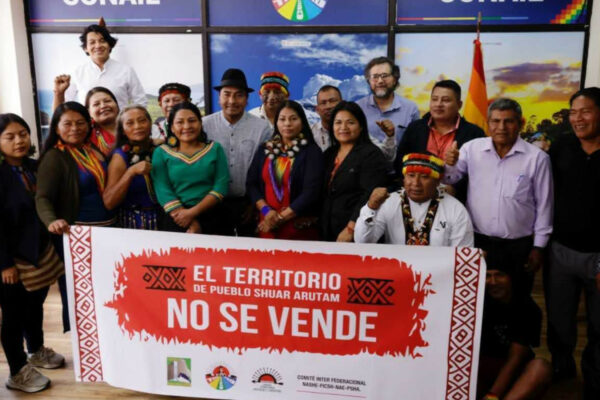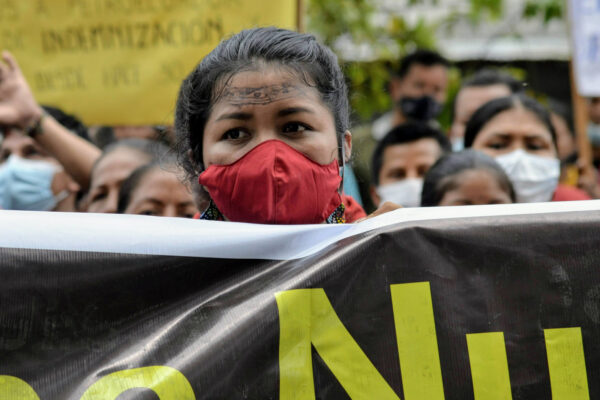Thousands of small-scale farmers, indigenous groups, students, and activists from around Latin America have come together in Quito, Ecuador, to protest plans to put in place a United States-backed free trade agreement across the Americas.
• Amazon Watch
• Global Exchange
• Americas Program
• Focus on the Global South
Demonstrations were held across Quito on Thursday and Friday by a range of groups eager to show trade ministers from the continent’s 34 nations – gathered in the city for a two-day meeting on a preliminary accord for the Free Trade Agreement of the Americas (FTAA) – that the free trade model promoted by the administration of President George W. Bush (news – web sites) will hurt, rather than help, most societies in Latin America.
At least 60 members of the groups, marching to the meeting venue at the JW Marriot Hotel, were reportedly injured in clashes with military and police forces, who used tear gas and fired guns at the demonstration, according to information received Friday afternoon by the Missionary Service News Agency.
The FTAA “will put an end to life, natural resources, national production, and the environment” and worsen “poverty, hunger, and unemployment” in the country, said the Confederation of Indigenous Nationalities of Ecuador (CONAIE), one of the major groups backing the march.
The coalition, which has achieved a high profile for its protests against the government’s economic austerity measures, believes the agreement would hasten petroleum and mining exploration in the country’s fragile Amazon region, and hurt the livelihoods of small-scale farmers by opening up markets to imports of subsidized food products from the U.S.
Other groups involved in the demonstrations took over a branch of downtown Quito’s McDonald’s restaurant to protest its policy of importing potatoes for french fries from the U.S., where agriculture is heavily subsidized, while Ecuador, a major potato producer, is experiencing a farming crisis.
Some U.S.-based groups have also raised concerns over the effect of such an agreement on workers’ rights across the hemisphere. New York-based Human Rights Watch (HRW) asked trade ministers Thursday to carefully consider labor rights as they prepared the FTAA blueprint.
“Free trade won’t lift lives if it rewards, rather than discourages, harmful child labor, sex discrimination, and anti-union conduct,” said Carol Pier, HRW’s labor rights and trade researcher.
According to Jason Mark of California-based Global Exchange, a social justice organization, the agreement would be “yet another example of the kind of free-market fundamentalism that has created a global race to the bottom that erodes environmental protection, workers’ livelihoods, and human rights.”
Opposition to the FTAA has been strengthened by the experience of the 1994 North American Free Trade Agreement (NAFTA) – involving the U.S., Canada, and Mexico – which serves as a model for the new plan. A recent study by two Tufts University researchers concludes that Mexico has received virtually no benefits from NAFTA. Instead, they found that unemployment and environmental degradation in the country have increased.
“It is widely accepted that the goal of economic integration should be to raise living standards,” wrote Timothy Wise and Kevin Gallagher. “According to our review of the public record, NAFTA has yet to fulfill that promise.”
While trade liberalization has increased investment in Mexico, and foreign direct investment has nearly tripled, economic growth remains sluggish – under one percent annually – and real wages for most Mexican workers have dropped by 23 percent since NAFTA began, according to Wise and Gallagher.
Moreover, NAFTA has not brought cleaner technologies to Mexican industries; industrial pollution has nearly doubled since 1988 and real spending on the environment has declined by 45 percent since NAFTA took effect, the researchers said.
Ecuador’s own experience with opening its markets to international trade has also been negative. A recent review by SAPRI-Ecuador – a group of World Bank (news – web sites), government, and nonprofit organizations – concluded that two decades of such policies have “stripped Ecuador of its productive capacity, deindustrialized the country, and reduced food security,” among other ill effects.
The Quito meeting of trade ministers is the latest in a series of negotiations that the U.S. hopes will result in a finalized FTAA by 2005.













